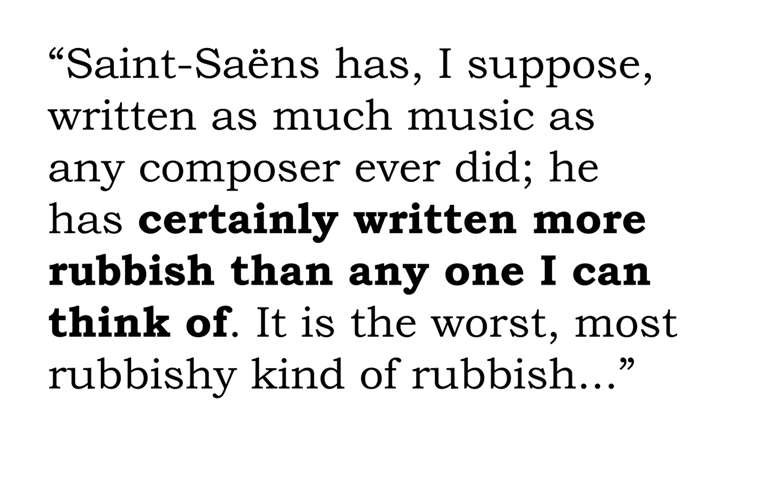Top 10 blunders by music critics
Jeremy Nicholas
Friday, January 16, 2015
Great composers and established masterpieces have not always been recognised as such by music critics. Jeremy Nicholas chooses his favourite critical clangers

No 1
Tchaikovsky Violin Concerto
“The violin is no longer played; it is pulled, torn, drubbed…Friedrich Vischer once observed, speaking of obscene pictures, that they stink to the eye. Tchaikovsky’s Violin Concerto gives us for the first time the hideous notion that there can be music that stinks to the ear.”
Eduard Hanslick, Neue Freie Presse, Vienna, December 5, 1881
No 2
Brahms German Requiem
A work “patiently borne only by a corpse,” wrote George Bernard Shaw, who declined an invitation to hear the work again: “There are some sacrifices which should not be demanded twice from any man; and one of them is listening to Brahms’s Requiem.”
No 3
Beethoven Symphony No 9
“The fourth movement is, in my opinion, so monstrous and tasteless and, in its grasp of Schiller’s Ode, so trivial that I cannot understand how a genius like Beethoven could have written it.”
Louis Spohr, his autobiography, 1860
No 4
Schubert Songs
“He has certainly written a few good songs, but what then? Has not every composer that ever composed written a few good songs? And out of the thousand and one with which he deluged the musical world, it would, indeed, be hard if some half-dozen were not tolerable. And when that is said, all is said that can justly be said of Schubert.”
James William Davidson, music critic of The Times from 1846
No 5
Bach Passion Music
“It was found dry and heavy, and very coldly received. Bach is a great and time-honoured name; but his vocal music is very little known in England and what is known hardly seems to justify the veneration of his classical admirers.”
Illustrated London News, April 1854
No 6
Rachmaninov
“Technically he was highly gifted, but also severely limited. His music is well constructed and effective, but monotonous in texture, which consists in essence mainly of artificial and gushing tunes…The enormous popular success some few of Rachmaninov’s works had in his lifetime is not likely to last and musicians never regarded it with much favour.”
Grove’s Dictionary of Music and Musicians (fifth edition)
No 7
Stravinsky The Rite of Spring
“The music…baffles verbal description. To say that much of it is hideous as sound is a mild description. There is certainly an impelling rhythm traceable. Practically it has no relation to music at all as most of us understand the word.”
Musical Times, London, August 1, 1913
No 8
Gershwin Rhapsody in Blue
“How trite and feeble and conventional the tunes are; how sentimental and vapid the harmonic treatment, under its disguise of fussy and futile counterpoint!…Weep over the lifelessness of the melody and harmony, so derivative, so stale, so inexpressive!”
Lawrence Gilman, New York Tribune, February 13, 1924
No 9
Chopin Ballade No 3
“Nothing but the nicest possible execution can reconcile the ear to the crudeness of some of the modulations. These, we presume, are too essentially part and parcel of the man, ever to be changed; but it is their recurrence, as much as the torture to which he exposes the poor eight fingers which will hinder him from ever taking a place among the composers who are at once great and popular.”
HF Chorley, The Athenaeum, London, December 2, 1842
No 10
Saint-Saëns
“Saint-Saëns has, I suppose, written as much music as any composer ever did; he has certainly written more rubbish than any one I can think of. It is the worst, most rubbishy kind of rubbish.”
JF Runciman, Saturday Review, London February 19, 1898
This article originally appeared in the September 2009 issue of Gramophone.







